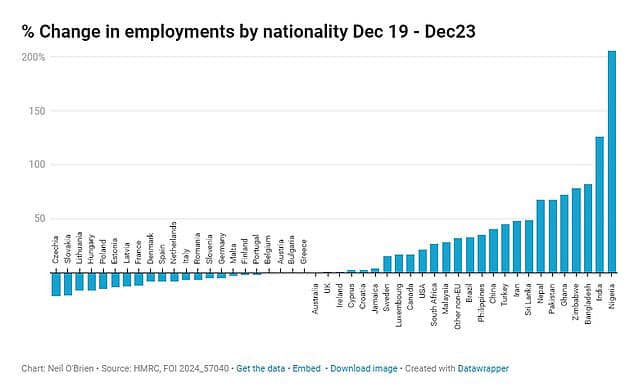HMRC data obtained by Freedom of Information request indicates that between 2019 and 2023 Indians and Nigerians took up more jobs in Britain than Britons. This trend implies significant changes in employment patterns after the UK implemented its post-Brexit migration system.
The Numbers Speak for Themselves
The biggest rise in employment was seen among Indian nationals, according to HMRC statistics of which there were, 487,900 more jobs. Next came Nigerian citizens who experienced an increase of 278,700 jobs while UK citizens had an increase of 257,000 jobs during this period.
In total, there were an extra 1.481 million employments, out of which 1.465 million were for those from outside the EU. On the contrary, EU nationals lost about 241,600 employments in the UK between December 2019 and December2023.
Post-Brexit Migration: A Game Changer
Neil O’Brien, Conservative MP who requested the information, noted that “extraordinary changes” have occurred since the launch of the UK’s post-Brexit migration system at the beginning of this year. He said that the United Kingdom economy provided more jobs for Indian and Nigerian people than for its own citizens.
Mr O’Brien admitted the shortcomings of using national employment figures as it does not capture unemployment, self-employment, or individuals with multiple jobs. However, he stressed that this is indicative of a shift by the country towards less EU migration and more non-EU migration.
He called for a ‘reboot’ of the immigration system, noting that since 2021 when the points based system was introduced, Indians and Nigerians have earned less money on average compared to Britons.
To reduce pressures on resources such as housing, infrastructure and capital, Mr O’Brien advocated for attracting higher earning migrants into Britain. Shifting towards more skilled immigrants would improve public finances and enhance economic performance.
According to Ben Brindle, an economist at the Migration Observatory think tank of Oxford University, certain indications point out that non-European Union immigrants were engaged in activities previously being done by EU employees prior to both Brexit and the COVID-19 pandemic.
‘The figures show that the number of jobs being carried out by non-EU workers in the UK has increased significantly since the pandemic,’ he said.
‘At the same time, when you look at sectors like hospitality and manufacturing, the data suggest there is some evidence that roles previously being carried out by EU workers are now being carried out by workers from outside the EU.
‘It is likely that we now have non-EU nationals taking lower paid roles that were previously filled by EU nationals.’










